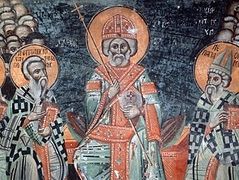Source: Notes on Arab Orthodoxy
August 26, 2016

Last week I wrote an essay about conciliarity and consultation. A dear reader asked how it is possible to realize conciliarity according to what I said. It seemed to him, sadly, that even if the matter was in principle clearly as I presented it, it is very far from being achieved in the state Church as we know it today. And so he seemed to be perplexed about how to deal with what was said: it should be mentioned that the brother asking the question is someone working earnestly and faithfully in the Church.
Indeed, conciliarity and consultation are impossible in the Church in human terms! They come by grace. In conciliarity and consultation, we seek to discover the work of God's Spirit in us, but only through God's Spirit! Unless we are in the Spirit and the Spirit has a way to flow into us, seeking what the Spirit is saying is impossible for us. So the issue is an issue of surroundings, of environment. What spirit do we encounter? What anxiety do we have? What is the concern among us? This does not come superficially and externally, but inwardly and existentially. This does not come from the cogitation of the brain, from the exchange of ideas and then a conclusion or agreement on points of view, persuasion, or the victory of one point of view over others; it does not even come from citations of what the fathers said or from what appears in the Bible. These things can easily be used inappropriately. We have the example of Satan in the temptation in the desert. Of course, those who seek what the Spirit is saying themselves deal with ideas and things that have been said, but in a different, interior spiritual environment. The profound sense that is at work within us is a sense that looks out to what the Spirit reveals. The verses of scripture and sayings of the fathers that they cite proceed spontaneously from what their souls seize when their inner parts move in the Spirit. Their concern is not to prove a position and so support it with proofs. This is a human approach. When the Spirit speaks, we do not know in advance in whom He will speak. If our inward parts are prepared, the Spirit, who speaks in one of us, will grant those who are ready to hear and discern Him. "This is it!" "This is what God wills!" This is accompanied by a strong certainty, profound peace, sure joy. The Spirit who is heard in us is the same who gives us this certainty, peace and joy. This is not of a rational, intellectual nature, but first of all of an existential, heartfelt nature and afterwards the intellect grasps what proceeds from the beating of the heart, to drive every thought to Christ's obedience.
But this cannot be if the heart is not upright and humble. With the upright you are upright, and with the crooked you show displeasure, said the Psalmist. Humility is the foundation of discernment. The upright is the one who faithfully walks toward God. Does a weak person sin? This is not an impediment if he unintentionally slips or if he sins and then strongly repents. The important thing is that the sin does not become a way of life for him, lest he embrace falsehood, lest he practice hypocrisy. At that moment, he becomes crooked. His intentions find ruin. God knows the hidden things of hearts. He turns away from us when we turn away from Him. He leaves us to fumble about in the darkness of our souls. But when our inner path is upright from His perspective, we walk in humility of heart because we place our sins before our eyes. We are conscious of our fragility and we realize that without Him we cannot do anything. Humility teaches us to seek what is His, not what is our own. Not to us, Lord, not to us, but to Your name give glory! The important thing is that He is right, not me. Whether Spirit speaks in me or in someone else is no longer important. The important thing is that He speaks to build up the brothers. I am aware that neither I nor anyone else encloses God. God is not in our hands, but rather we are in His hands! Therefore, the important thing is not that the Lord God speak in me: if I sought this, that would be seeking my own pride and vanity! It is enough for me that My Lord grants me to hear and that I discern His voice when He speaks and in whom He speaks. I rejoice in this. Therefore, I proceed in fasting, prayer, repentance and purity of heart so that I might at all times be ready to listen. "Speak, O Lord, Your servant listens!" "Hear, O Israel!" This is what is hoped-for. May the Lord speak in whom He wills.
There are two paths that stretch before us: the spiritual path and the merely natural [= ψυχικός] path. We blaze the spiritual path with piety, the fear of God, poverty and humility and we blaze the merely natural path with passions, prosecutions, appearances and vanity. In the first path, we pray. In the second path, we merely perform rituals. In the first path, we teach what we sincerely practice. In the second path, we trade in words. In the first path, we serve. In the second path, we lord over. Spiritual things, from where we know and where we know not, spread within us and around is as a divine air. Merely natural things, in general, without our realizing, spread within us and around us as a human, passionate air. There merely natural air inevitably spreads without God's Spirit, in what is demonic. There is absolutely no neutrality either to what is merely natural or to what is purely intellectual and mental.
There is no mixing light and darkness. Therefore, corruption cannot coexist with incorruption. To ignore corruption in the Church is to participate in it! If vices become domesticated in the Church and the feeling fades in us that we must eradicate them, then at that point we are abiding in impurity! At that point, the Spirit leaves us to wallow in the mud and veils Himself. He departs from the group. Many stumble, leave the Church, and blaspheme God's name. The passions reign and the hearts of many are alienated. At that point, God no longer speaks in communion because there is no longer a church, a communion that is heard except among a few individuals, a little flock here and there. The Church becomes something merely natural [= ψυχικός]. It flourishes on the outside but is empty within! Concern grows for human things: ideas, institutions, activities, rituals, choirs, dinners, appearances, words... and concern diminishes for seeking the fruits of the Spirit: love, joy, peace, long-suffering, kindness, charity, faith, meekness, chastity... When we have reached this point of not feeling, what witness do we give to the Spirit in the Church? We ourselves have cut ourselves off from God. We abide in estrangement and we pretend that we are children of His household! What is left for us to offer others? Consumerist religious trinkets? He who has nothing cannot offer anything. What we offer, we offer first of all from our spirit. The Bible, the fathers? What's the use? The Jews also taught the Bible and transmitted the fathers, but nevertheless they killed their Lord and came to be of a father, Satan. The Bible came to be a rumination for their passions and jealousies.
So how are conciliarity and consultation realized, then? Deep down, by first of all pursuing the path of the people of Nineveh because, in all frankness and transparency, we have greatly strayed! Repent to me, and I will repent to you! Lest conciliarity and consultation inevitably transform into merely natural [= ψυχικός], passionate, worldly ways of acting that do not bear witness to Christ the Lord in the Spirit, but rather for crucifying Him! Any conciliarity or consultation that is not in the fear of God and sincere repentance, is an extension of the council of Caiaphas that judged Christ to have blasphemed and called for His death! This is what happens to those who blaspheme against the Son of God! They judge Him in the remnant of those who keep faith in Him to have blasphemed! The Antichrist is not foreign to our surroundings! "Even now many antichrists have come" (1 John 2:18). Many indulge in his environment and are swept away by non-feeling. They know, but in their delusion they no longer care!
"Beloved, do not believe every spirit, but test the spirits, whether they are of God" (1 John 4:1).
Archimandrite Touma (Bitar)
Abbot of the Monastery of St Silouan-- Douma, Lebanon
July 24, 2016



